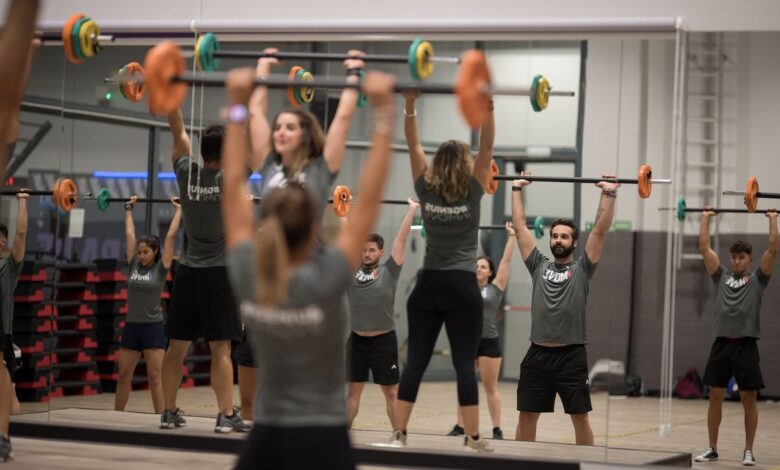Fitness employers and unions sign the V collective agreement for sports facilities

Four years after the unions denounced the IV agreement on sports facilities, the fitness sector and sports centers once again have a labor framework agreed upon by the parties. Employers and unions have signed this Thursday the V collective agreement for sports facilities and gyms, which sets the legal framework for the 2023-2025 triennium. As already advanced 2playbookwill be retroactive with effect from May 1, 2023.
The bulk of the final text, which will be published in the BOE in the coming weeks, stems from the preliminary agreement reached by the parties on June 5 and which has been ratified in recent days by the different boards of employers and union assemblies. The new agreement has the support of the two unions present at the negotiating table, CCOO and UGT, as well as two of the three employers’ associations: Fneid and the Spanish Association of Golf Courses (Aecg), which have sufficient representation to be able to approve a text from which Aeesdap has distanced itself.
The employers of the sector of sports and rescue and first aid services to public administrations managed to postpone the final signature for another week, until this Thursday, a last attempt to have some of their requests met. Finally, Aeesdap only managed to convince the other parties about one point: an improvement in the clause that affects the subrogation of contracts. As agreed, the new agreement will regulate more clearly what type of information and documentation companies will have to provide when they subrogate a service.
This employer, on the other hand, did not obtain any modification regarding two specific requests. One of them, remove from the agreement the professionals of rescue and first aid in natural spaces. The unions opposed this issue. There was also no agreement in relation to another point, the transport bonus. Aeesdap wanted to transfer the transport bonus to an agreement bonus; but finally this question remains as it was, that is, per day worked. The labor side believed that the worker would lose wages if the formula proposed by Aeesdap was applied. In the case of the transport bonusa payment of 2.8 euros per day was agreed for 2023, 2.9 euros per day for 2024 and 3 euros in 2025. You pay for going to work, regardless of the hours of employment. This represents increases of 8.5%, 12.4% and 16.2%, respectively, in relation to the transport bonus that was agreed in the previous agreement, and which was 2.58 euros. It was currently at 2.63 euros.
Aeesdap also regrets that other requests such as the claim of “differentiated treatment” based on an own agreement to include the singularity of the contracts signed with the administrations, requested to adjust the effects that the salary increases would have on the contracts with the public administrations through “a progressive application of this improvement”. A series of issues that the rest of the employers did not agree to include in the new wording.
Updated salary tables and above the SMI effective from May 1
The main improvement that the new agreement will bring are updated salary tables. The new proposal, with increases unrelated to the CPI, raises the minimum salary of a general director or manager to 19,051 euros per year, which represents an increase of 17.7% in relation to the figure that has been carried over from the previous agreement for group 1. For group 2, the increase is 15.5% for the medical department and 11.9% in the case of nurses, physiotherapists and maintenance managers. For group 3, the increase for coordinators is 6.5%, while that for multidisciplinary sports technicians is 4%.
For the lower categories the percentage increase is lower. In group 4, the increase contemplated is 1.5% in the case of level 1, it includes sports technicians, lifeguards, janitors and cleaning managers; and 0.5% in the case of level 2, which integrates administrative assistants and access controllers. For group 5, which includes cleaning staff and maintenance laborers, the increase with respect to the SMI is 0.2%.
The increase percentages for the next two years in which the agreement will be in force are uniform for the rest of the categories. The update for 2024 foresees a rise of 2%. Looking to 2025, the increase is double, 4%. This means that, with respect to the figures carried over from the previous agreement, a group 1 worker who receives the minimum contemplated in the agreement will see his salary increased by 22.4% over these three years, up to 19,818.96 euros.
Another aspect to which an agreement has been reached is in terms of occupational health. There will be a reinforcement in terms of occupational health surveillance, which should translate into more in-depth physical evaluations and reviews for workers, so that health problems derived from their work activity can be detected and recognized. This point also includes greater care and protection for women, with more specific medical examinations during pregnancy.
On the other hand, the text also establishes that discontinuous permanent contracts can be considered part-time. There are also other aspects related to the articles that facilitate the organization of work, such as the regulation of vacation periods. If until now they could distribute the 23 days of vacation in two periods, now they will be able to do it in three. One of these periods will have a minimum of 15 days. The remaining eight days will not need to be enjoyed all at once, but can be divided into two periods of a minimum of three days.
With regard to paid leave, they will be renamed leave of absence with job reservation. In addition, the accrual of three annual days of own affairs is established in proportion to the start date of the employment relationship for four-month periods.
A relevant issue is the temporary disability supplement. Specifically, article 55 of the current agreement regarding the temporary disability supplement is amended so that the obligation to pay said supplement on the date of termination of the employment relationship ceases.
Creation of a job bank for the sector
Fneid will also launch a talent pool for the sports sector with the aim of improving employability and continuing to promote job creation in this industry. Specifically, a tool will be promoted that consists of a platform in which employers and candidates can establish direct contact using technology and innovation in the selection processes, which will make it possible to have a wide range of profiles, as well as job opportunities. that facilitates the employability and development of talent in the sector, making the search process simple, fast and efficient.




